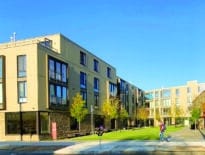Real estate’s rocket-like trajectory has left Greater Boston’s artists, performers and craftspeople pushed out of studio space left and right. Art, as the common trope holds, is rarely the most lucrative profession, and it shows.
As Steve Adams details in this week’s issue and a previous story in the Nov. 8 issue of Banker & Tradesman, there are glimmers of hope.
Berkeley Investments and BioMed Realty hope their projects in Allston and Kendall Square, respectively, can prove arts are a valid and exciting component for new, class A commercial developments. And with future demand for brick-and-mortar retail spaces mandated by planners searching for “activated” ground floors in question, arts space can offer a compelling alternative or a complementary use for the same real estate, an idea Boston Mayor Michelle Wu endorsed on the campaign trail.
And the city has at least one developer, in the shape of Bill Madsen Hardy and his New Atlantic Development company, that knows how to integrate existing studios into a viable redevelopment project that can financially stabilize these studios and fund needed renovations.
But serious challenges remain. No commercial brokerage specializes in cultural space, meaning there’s no clearinghouse of space for rent nor a coterie of real estate agents versed in looking out for arts tenants’ specific needs.
And it’s an open question whether many lenders would consider performance spaces or artists studios to be credit tenants capable of underwriting a construction loan. Creating new or repairing existing cultural space – or even just operating it – is expensive. Berkeley and BioMed are smart to be planning their projects around Boston’s booming life science industry, which can cross-subsidize the arts space included in the project. City funds and a robust technical assistance program for arts groups being planned by the Mayor’s Office of Arts and Culture will help address this critical problem.
Clearly, much work needs to be done and no solution will be found overnight.
But above all, policymakers can’t aim for a few new, 350-seat theaters. By keeping their focus solely on venues that generate ribbon-cuttings, civic leaders will guarantee that the region’s arts scene will never be accessible to, nor speak in the languages of the average person.
Instead, they must approach their work with a goal of abundance. Cities with great arts scenes have cultural spaces – including rehearsal and production spaces – that are cheap just by dint of their abundance. These give the grocery store clerk who moonlights as a jewelry-maker or the bus driver who lives a double life as the city’s next underground rap sensation the infrastructure to build their career to the next level, or simply make their craft sustainable as a part-time affair, no matter their race, class or country of origin.
Letters to the editor of 350 words or less may be submitted via email at editorial@thewarrengroup.com with the subject line “Letter to the Editor,” or mailed to the offices of The Warren Group. Submission is not a guarantee of publication.





